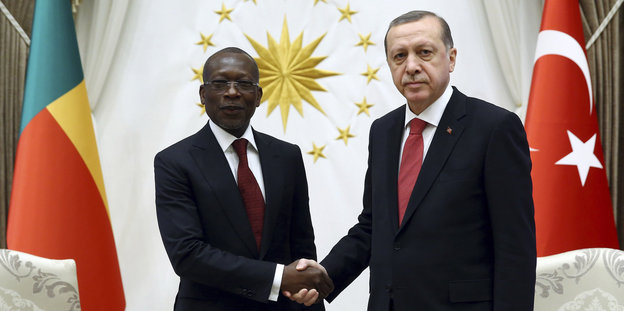Migration policy in Benin: Little development in spite of european money
Benin is a transit country, mainly for people from Nigeria. Many Beninese try to stay in the region looking for jobs in neighbouring countries instead of making their way through the desert to europe.

Benin's president Patrice Talon visiting Ankara Foto: ap
Benin with it's almost 11 million inhabitants has long been thought of as the archetypal nation of emigrants. According to various studies between 2006 and 2012, it was estimated that around three million Beninese people live outside the country.1 Meanwhile, the World Bank is now estimating that four million Beninese people in 2013 have transferred a total of 73.5 billion CFA Francs (112 million Euros) to Benin.2
According to Professor John Igue, however, it is also increasingly becoming a country of immigrants, which means that, according to the International Organisation for Migration (IOM), 2.3% of the population are migrants. About three quarters come from the neighbouring countries of Nigeria, Togo and Niger.
The number of Beninese people trying to reach Europe by land remains, however, limited. In 2015, 845 asylum applications were made in Europe, the United States, Canada and Brazil. With 363 applications, Germany is the most popular country for refugees and migrants. The rejection rate is 93 per cent.3 Other countries which are also popular in the region include the Côte d’Ivoire, Gabon, and also the Democratic Republic of Congo. Up-to-date, reliable figures do not exist, but the increased flight connections are indications.
The business capital Cotonou is, however, attractive to Nigerians from the South, who use Benin as a transit country and continue their journey from Cotonou towards North Africa and Europe. Unlike, for example, in Lagos or Port Harcourt in Nigeria, there are nonstop buses to Niamey, the capital city of Niger. This is possible as a result of the „Protocol on Free Movement of Persons, Residence and Establishment“ of the Economic Community of West African States (ECOWAS). When crossing the border from Nigeria into Benin, an ECOWAS passport is even required. It is possible, at least at the Seme border crossing in the far South, to cross the border without papers in exchange for a small payment – approximately one to three Euros.
A bilateral agreement with Nigeria to combat human trafficking, which often takes place in Cotonou, was reached in 2009. It includes the prosecution of the alleged traffickers, as well as the return of victims to their home countries. This was followed in 2011 by a further agreement with the Democratic Republic of Congo for action against child trafficking.
Benin is still not classified as a safe home country by Germany, but it is by former colonial power France; a repatriation agreement has been in place since 2010. In general, Benin is seen as politically stable, demonstrated by the peaceful transfer of power in March 2016. Unlike in neighbouring countries, homosexuals are not persecuted.
Benin has been the darling of European development cooperation for decades. The Gesellschaft für Internationale Zusammenarbeit (the „German Corporation for International Cooperation“) has been in place for around 35 years now, and has a staff of 235. There are many other public and private cooperations. However, Benin remains one of the least developed countries. In the current United Nations Human Development Index, it ranks 166 out of 188. The latest Corruption Perception Index of Transparency International (TI) ranks the former French colony rank at number 83. The illiteracy rate in 2008 was 58.3 per cent.
In recent years, there have been several migration projects. Originally, the aim was mainly to gather missing data. A further aim, in cooperation with Mali, Cameroon and Senegal, was the programme “Partnership for labour migration management“4, which was launched in 2009 within the framework of the EU-Africa partnership. Its particular objectives were to make international job vacancies publicly available and to create a better network between the west-African countries.
The foundation for the cooperation between the EU and Benin is the National Indicative Programme 2014-2020, which is part of the current European Development Fund. It supports the areas of good government leadership (€184 million), sustainable development in agriculture (€80 million), access to energy supply (€80 million) and support for the civil society (€18 million). The total amount from the previous EU development fund, which had a similar focus, amounted to €380.37 million.
Benin is the location of the ECOWAS Multinational Maritime Coordination Centre (MMCC) and has therefore had to join the fight against piracy. In terms of economy, the country is highly dependent on revenue from the port, which makes up about ten per cent of the country's GDP. In 2013, the EU had already made over €4.5 million available to the Critical Maritime Routes in the Gulf of Guinea Programme (CRIMGO).
